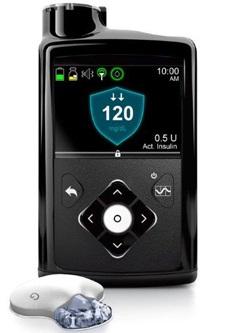
The U.S. FDA has approved the MiniMed 670G system developed by Medtronic, which sounds a little arcane in its description - a hybrid closed-loop insulin delivery system - but is actually intuitive in concept. It's a computer algorithm working with a continuous glucose monitor to learn an individual’s insulin needs and adjust their insulin pump all day, every day, to keep the lows from being too low and the highs from being too high.
That's a big step on the road to a true fully automated, closed loop system - an "artificial pancreas" that can provide the proper continuous background (basal) insulin, for Type 1 diabetics.
It sounds like it's pure technology but that's a little like thinking an iPod was just an .mp3 player. There were lots of .mp3 players when Apple rolled theirs out, but it was the software that put them on the map, and that is important here also. The algorithm learns about the individual over time and converges on the best delivery. The FDA gave it approval after a clinical trial with 123 Type 1 diabetics (two-weeks where it was not used, then three-months as frequently as possible) showed no serious adverse events. The company, Medtronic, is required to undergo a post-market study and this hasn't been tested in anyone under age 14 yet.
Some highlights, courtesy of Diatribe:
A 0.5% reduction in A1c, bringing patients from a low initial A1c of 7.4% to 6.9%;
A 44% reduction in time spent with low blood glucose (under 70 mg/dl);
A 40% decline in time spent in dangerous hypoglycemia (under 50 mg/dl);
An 11% decline in time spent over 180 mg/dl and an 8% improvement in time-in-range (71-180 mg/dl).
Maybe best of all, in an era when Big Pharma is getting all of the attention for it's $100,000 treatments, this will hit the market next year and the company must expect it to go for $799 - because users signing up for their existing $500 Med 630G system will get the new technology then for a very pleasant $299.
Obviously it is not an artificial pancreas, users still need to help it by entering carbohydrates of meals, understanding that they need to abide by bolus insulin (taken at mealtime) correction recommendations, and like all sensors it has to be calibrated. But for the five percent of the public that are Type 1 diabetics and are constantly monitoring their glucose levels and getting insulin therapy through injection, that's a breeze.



